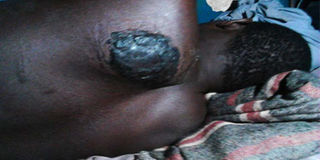Anthrax outbreak hits Arua

Sick. A man suffering from anthrax shows some of the symptoms of the disease. PHOTO BY FELIX WAROM OKELLO
What you need to know:
- The MP for Lower Madi, Mr Ismail Ogama, said: “I will have to approach the relevant ministries on this because we cannot continue losing lives of people and animals. The district should give us more documents so that I can present them on the floor of Parliament.”
- Nineteen people were in April infected following the outbreak of the disease in Arua District.
Arua. More than 1,000 animals have died following the outbreak of anthrax in Arua District.
The disease has also claimed two people, according to the district veterinary officer, Dr Willy Nguma.
The blood tests carried out by the Uganda Virus Research Institute (UVRI) in Entebbe have confirmed the outbreak of the disease although the Minister of Health, Dr Ruth Aceng, recently downplayed its presence in Arua and Kween districts.
According to reports from the district, the first outbreak was reported in December 2016 and confirmed in March 2017, after blood samples were tested by UVRI.
Speaking to Daily Monitor on Monday, Dr Nguma said: “We have confirmed from the laboratory tests the presence of anthrax. So far, we have 28 people infected and we have recorded two deaths. If the ministry still believes there is no anthrax despite the positive results from the central laboratory from Ministry of Agriculture, then this is contradictory. There shouldn’t be denial game in this because economic and social life of people are being affected.”
Statistics
The statistics from the district indicate that so far 1,087 animals have died following the outbreak.
Rigbo, Rhino Camp, Uriama, Odupi, Imvepi and Pawor sub-counties are the most affected.
“We have tried to mobilise farmers to buy their own vaccines, but they are not willing to do that. So long as the animals are not vaccinated and carcasses are being eaten, the outbreak cannot end,” he said.
The people of Arua depend on animals for economic livelihood because they sell off the animals to enable them pay school fees for their children and to fend for their families.
Farmers are worried that if they continue losing their herd, they will not be in position to look after their families.
The district had requested government to supply vaccines to contain the outbreak, but none has been released.
This was after the chief administrative officer endorsed a report to the various ministries but there has been no response.
The district health officer, Dr Patrick Anguzu, said: “We have some drugs that can help in treating the human beings who are infected. We are sitting on a time bomb. We have been liaising with the World Health Organisation and veterinary department. We have developed strategic plans but at the moment we do not have funding to do extensive sensitisation and vaccination.”
He suggested that the best way to end anthrax is through vaccination and that the district has proposed that the farmers form groups to have their animals vaccinated.
For one animal to be vaccinated, a farmer has to spend Shs2,000 to purchase the vaccines.
The MP for Lower Madi, Mr Ismail Ogama, said: “I will have to approach the relevant ministries on this because we cannot continue losing lives of people and animals. The district should give us more documents so that I can present them on the floor of Parliament.”
Nineteen people were in April infected following the outbreak of the disease in Arua District.
ANTHRAX. According to the World Health Organisation, humans generally acquire the disease directly or indirectly from infected animals, or occupational exposure to infected or contaminated animal products. Control in livestock is, therefore, key to reduced incidence. The disease is generally regarded as being non-contagious. Records of person-to-person spread exist but are rare.



